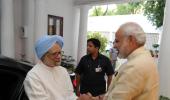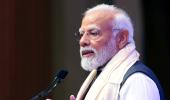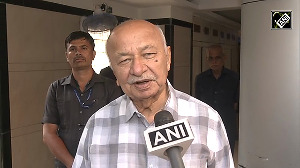Why did Modi single out the Congress and its leaders for the most pugnacious verbal assault while sparing other regional adversaries?
If he is trying to get some parties to break the Opposition ranks, it means that the BJP's present bravado is for effect.
Nilanjan Mukhopadhyay, author of Narendra Modi: The Man, The Times, begins a new column for Rediff.com.

With two combative speeches, one after another, in the Lok Sabha and Rajya Sabha respectively and sandwiched between the President's Address to the joint sitting of Parliament and the 59-page 'White Paper on the Indian Economy', the troika of the government, Bharatiya Janata Party and Prime Minister Narendra Modi have blown the electoral bugle cacophonously while making it obvious that the current regime considers the battle as having been de facto won.
While no battle is won till the proverbial last ballot is counted, fewer are willing to take contrarian bets this time.
Modi's chutzpah while okaying outlandish electoral goals which are publicised by the party's humungous advertising and social media machinery is well known.
Mission 272+ in 2014 was just the first of many to follow and it is best to leave readers recalling the rest.
However, this is a first that in the course of his reply to the debate on the Motion of Thanks to the President's Address, Modi mentioned a tally figure that would be breached during the elections to the 18th Lok Sabha: 370 seats for the BJP and 400+ for its alliance, the National Democratic Alliance.
In the outgoing Lok Sabha, as is well known, the BJP has a tally of 303.
These included all seats (along with NDA partners), or close to it, from several states: Maharashtra, Uttar Pradesh, Bihar, Madhya Pradesh, Rajasthan, Karnataka, Haryana, Jharkhand, Chhattisgarh, Delhi, Uttarakhand, Himachal Pradesh, a few smaller states like Arunachal Pradesh and Tripura, and Union territories like Chandigarh, Daman and Diu etc.
In most of these states, the BJP also polled more than 50 percent, or close, of the votes.
Only in UP and Maharashtra, the NDA's tally was significantly lower than the total seats in the state: 64 out of 80 in UP and 41 out of 48 in Maharashtra.
Because the BJP has on several occasions reached the target it set, Modi's claim cannot be right away dismissed as bluster.
Yet, it must be pointed out that the target of nearly 70 extra seats can be bagged by his party only if the party enhances its tally in UP and Maharashtra (with new political configurations) along with improving upon its parliamentary strength from West Bengal and Odisha (18 and eight respectively).

Modi would be aware of this and that is why is attempting to split the anti-BJP vote to lower the Index of Opposition Unity that at one point appeared impressive, before the INDIA alliance began imploding.
In his speeches, Modi was unsparing in his criticism of the Congress while being soft on other regional parties.
Unambiguously, he indicated that the Congress was the primary target despite its declining strength: 'The Congress is primarily responsible for the state the Opposition finds itself in.
'The Congress had a good opportunity to become an effective opposition party, and ten years was not an insufficient period.
'But it failed in fulfilling this responsibility completely. Not only has the party and its leaders failed to succeed, but it also hindered the rise, growth and emergence of others with the potential.'
Modi's concern for the Opposition was akin to shedding crocodile tears.
This opportunity, however, has been provided by the Congress for being almost single-handedly responsible for the virtual collapse of a joint opposition front against the BJP in West Bengal and weakening it in Bihar.
It remains to be seen if after the setbacks, the INDIA bloc remains in existence as a fighting unit till polling.
Why did Modi single out the Congress and its leaders for the most pugnacious verbal assault while sparing other regional adversaries?
Was it only to create cleavages within their ranks or to wean some his way?
Reports mention that such efforts are underway with the Jayant Chaudhary-led Rashtriya Lok Dal.
But if he is trying to get some parties to break the Opposition ranks, it means that the BJP's present bravado is for effect.
Is this why investigative agencies are probing several Opposition leaders?
Does the ferocious attack on the Congress also stems from realisation, that despite its further weakening, it still remains the only nationwide Opposition party with capacity to act as a fulcrum for joint opposition?
From when PM Modi assumed office, he consistently attacked dynastic politics.
However, he chose silence when it was pointed out that his own party had several from political families.
Actually, in the 16th Lok Sabha (2014-2019), of the total of 130 Lok Sabha MPs listed as dynasts (24% of the entire House), the most (46), were from BJP.
In the Union Cabinet, while Piyush Goyal, Jyotiraditya Scindia and Anurag Thakur were preceded by their fathers in politics, the sons of Rajnath Singh and Amit Shah follow in their footsteps (Jay Shah is BCCI secretary, but cricket management and politics are contiguous domains).
For the first time Modi decided to deflect this criticism against the BJP and defend the party's dynastic leaders. He defined a dynast or dynastic party as which is 'run by a family, prioritises its members, and where all decisions are taken by family members.'
Modi asserted that those in the BJP, despite being from families with successful politicians, entered politics by their own dint and got elected.
They 'cannot be considered to be dynasts.' This is little but blatant double-standards: Would Jay Shah, for instance, been a BCCI official if not for being the home minister's son? Likewise, there are numerous other examples.
Modi's two speeches were demarcated into clear sections wherein various components of his campaign plank figured.
No prizes for guessing that the Ram temple figured prominently among the cluster of ideological achievements.
This was listed by President Droupadi Murmu too: Ram Mandir, Article 370, Triple Talaq and CAA.
Modi's articulation was rooted in the Sangh Parivar's ideology of cultural nationalism: 'Ram temple in Ayodhya will continue to give energy to the great culture and tradition of India.'

And finally, if Modi speaks for more than an hour at a stretch, is there any way he can forget making a dig at Jawaharlal Nehru?
Eventually, if he wins this time, he will equate India's first PM's record of leading his party to three successive electoral victories.
Modi quoted Nehru's letter of June 1961 to chief ministers.
If Modi is quoting anyone, can he avoid cherry-picking?
In order to show Nehru as being against reservations, he selectively quoted from that letter: 'I dislike any kind of reservation, particularly in jobs and services. I am strongly against anything which leads to inefficiency and second rate standards.'
Further ahead, despite Nehru not writing anything of this sort, Modi accused Nehru of writing 'that if SC/ST/OBC get reservations in jobs then the standard of government work will fall.'
Significantly in an August 2004 statement, L K Advani quoted the same letter (external link) but with a different interpretation: 'Nehru was aware of the limitation of reservations as the sole instrumentality for the socio-economic uplift of those who are socially and economically backward.'
Quite clearly, damning Nehru is more important than staying with truth for the PM. He has an election to win and who would microscopically examine his words but the odd journalist?
Nilanjan Mukhopadhyay is an author and journalist based in Delhi-NCR. His latest book is The Demolition, The Verdict and The Temple: The Definitive Book on the Ram Mandir Project, and he's also the author of Narendra Modi: The Man, The Times.
Feature Presentation: Aslam Hunani/Rediff.com











 © 2025
© 2025